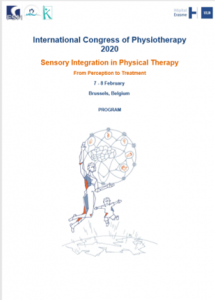International Congress of Physiotherapy 2020 : 7 – 8 February Brussels, Belgium
International Congress of Physiotherapy 2020
Sensory Integration in Physical Therapy
From Perception to Treatment
7 – 8 February
Brussels, Belgium
Benoît Chevalier interviendra sur :
Developmental Care in Food Orality Disorders : an Issue of Probalistic Epigenesis 
Eating disorders are a major concern for families and caregivers. In the literature, 25-35% of healthy infants and 40-70% of preterm newborns or suffering from a chronic pathology develop eating disorders.
These disorders can range from a disabling gag reflex to sometimes complex clinical tables involving multidisciplinary teams. Eating disorders involve major risks of undernutrition, but also alteration of attachment processes and sensorimotor development. The construction of the developmental trajectory of the young eater involves a knowledge of the child’s ecological niche and is interactions with the environment. From uterine sucking to food diversification, orality issues imply the therapist knowledge on the subject to accompany vulnerable children in their nutritional project and in their development. Health professionals often trivialize the consequences of eating disorders without any real knowledge of the subject. The child’s eating difficulties can not only be psychological or physiological but both are linked. Meal time is not only a nutrient intake, but also a special time of emotional and psychic foods. The basic skills of the development of social bonding, language and orodigestive skills involve a redundancy of experiences between the child and his environment that will promote the construction of rich sensory and cognitive neural networks (probabilistic epigenesis). The impact of eating disorders is often underestimated because there is often more interest in the quality of the staturo-weight curve than in the child’s oral skills. Early management helps to limit dramatic consequences on the overall development of the young eater, not only physically, biologically but also psychosocially.
lien vers le congrès : ici